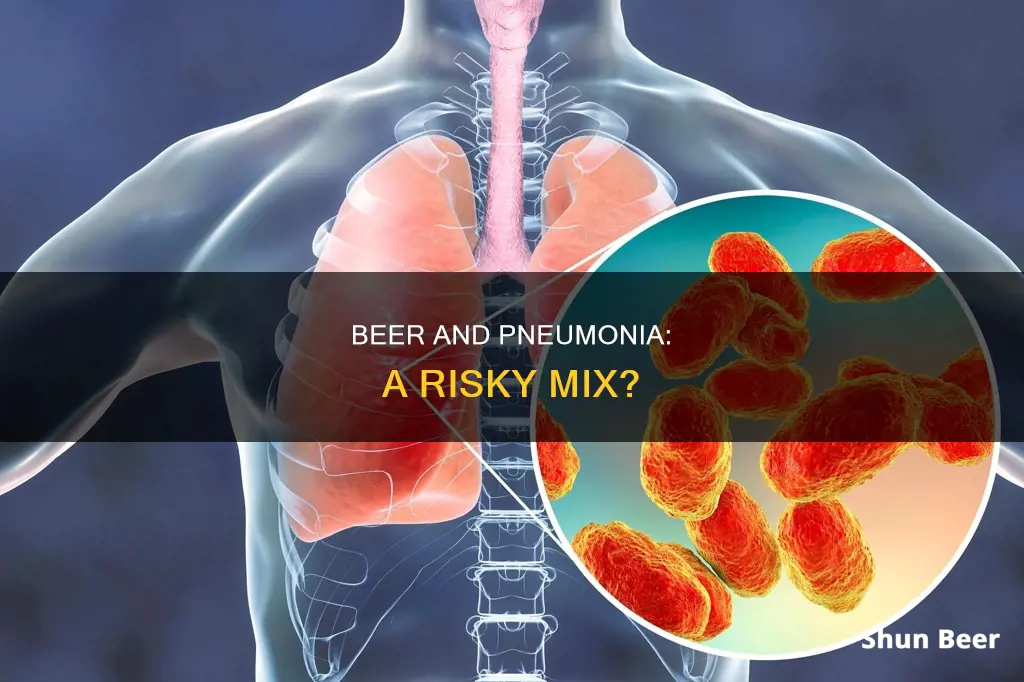
Alcohol abuse is a risk factor for pneumonia and can lead to poorer outcomes for those with the disease. Alcohol impairs host defences, altering the body's flora and impairing defensive mechanisms along the respiratory tract. It also increases the risk of aspiration by blunting mental function and suppressing the cough and gag reflexes. Alcohol abuse can also cause acute respiratory distress syndrome (ARDS), which can be fatal. However, the evidence for a link between alcohol abuse and infection by gram-negative bacteria is weak.
| Characteristics | Values |
|---|---|
| Risk Factors | Children under the age of 5, adults 65 and older, individuals with certain chronic conditions such as diabetes or heart disease, and individuals with underdeveloped or weakened immune systems |
| Symptoms | Fever, chills, a cough with phlegm, and trouble breathing |
| Diagnosis | Medical history review, physical exam, imaging and lab tests, blood and sputum cultures |
| Types of Pneumonia | Bacterial, viral, fungal |
| Alcohol's Effects on the Immune System | Disrupts immune pathways and impairs the body's ability to defend against infection |
| Alcohol's Effects on the Lungs | Blunted cough and gag reflexes, decreased ability to clear mucus from lungs, impaired immune defences, decreased response to pathogen exposure |
| Acute Respiratory Distress Syndrome | Alcohol abuse can increase an individual's risk of acute lung injury and ARDS development |
What You'll Learn
- Alcohol impairs host defences, including the body's flora and immune system
- Alcohol abuse increases the risk of acute respiratory distress syndrome (ARDS)
- Alcoholics are more likely to develop a critical illness that puts them at risk of ARDS
- Alcoholics are more susceptible to tuberculosis
- Alcoholics are more likely to experience alcohol withdrawal syndrome

Alcohol impairs host defences, including the body's flora and immune system
Alcohol impairs host defences by affecting the body's flora and immune system. Alcohol affects the body's flora by altering the oropharyngeal flora, facilitating colonisation by gram-negative organisms in the oral cavity. It also induces changes in the defence mechanisms of the upper respiratory tract, allowing gram-negative organisms to adhere to the mucosal surface more easily.
Alcohol impairs the immune system by disrupting the normal functioning of the innate and adaptive immune responses. It affects the innate immune system by inhibiting and accelerating inflammatory responses, depending on the pattern of alcohol exposure. Acute alcohol exposure inhibits inflammatory responses, while chronic alcohol exposure accelerates them. Alcohol also impairs anti-inflammatory cytokines and interferes with the normal functioning of the adaptive immune response, including both cell-mediated and humoral responses. These effects enhance the susceptibility of chronic alcoholics to viral and bacterial infections.
Alcohol also affects the body's flora and immune system in the lungs. It alters the first line of the innate cellular defence, the mucociliary apparatus, against invading pathogens such as the respiratory syncytial virus (RSV). It also has harmful effects on other aspects of neutrophil functioning, including recruitment, phagocytosis, and production. In addition, alcohol-induced oxidative stress in the lungs contributes to alveolar macrophage dysfunction.
Beer and Keto: What's the Verdict?
You may want to see also

Alcohol abuse increases the risk of acute respiratory distress syndrome (ARDS)
Alcohol abuse is a risk factor for acute respiratory distress syndrome (ARDS). ARDS is a severe form of acute lung injury that usually develops soon after a major injury or illness. It is characterised by diffuse activation of inflammatory pathways, resulting in hypoxemia, fluid accumulation in the alveolar space, and inflammatory cellular infiltration.
Chronic alcohol abuse is associated with an increased incidence of ARDS. In a study of 351 patients at risk for ARDS, 43% of those who chronically abused alcohol developed ARDS, compared to only 22% of those who did not. Another study of 220 patients with septic shock found that 70% of those who chronically abused alcohol developed ARDS, compared to 31% of those who did not.
Alcohol abuse has detrimental effects on multiple organ systems and is an important risk factor for the development of ARDS. It impairs the function of alveolar macrophages, which play a critical role in the clearance of pathogens and the immune response. Alcohol abuse also decreases the levels of glutathione, an antioxidant that protects the lungs from free radical-mediated injury and inflammation.
In addition to its effects on the immune system, alcohol abuse can increase the risk of pneumonia, tuberculosis, and respiratory syncytial virus infection, all of which can lead to ARDS. It alters the oral flora, facilitating the colonisation of gram-negative organisms in the oral cavity and increasing the risk of aspiration. It also suppresses the cough reflex and impairs mucociliary clearance, further compromising the body's defences against respiratory infections.
Overall, alcohol abuse increases the risk of developing ARDS by compromising the immune system and increasing susceptibility to respiratory infections.
Beer and Yeast Infections: Is It Safe to Drink?
You may want to see also

Alcoholics are more likely to develop a critical illness that puts them at risk of ARDS
Alcoholics are more likely to develop a critical illness that puts them at risk of acute respiratory distress syndrome (ARDS). ARDS is a form of inflammatory lung injury and hypoxemic respiratory failure with specific clinical and pathological features. It affects about 200,000 individuals in the United States annually and carries a mortality risk that ranges anywhere from 20% to 50%. It is a common diagnosis in the intensive care unit (ICU) and occurs in about 15% to 20% of all patients that require mechanical ventilation.
Alcohol abuse can increase an individual’s risk of acute lung injury and ARDS development. ARDS can result in severe deficiency of oxygen in the bloodstream as a result of widespread alveolar (i.e., air sacs) inflammation and the resultant accumulation of fluid in these airspaces. While there are a number of factors that can lead to ARDS (e.g., physical trauma, sepsis, aspiration-induced lung injury, bacterial infection), alcohol abuse has been shown to increase the odds of any given at-risk individual developing the condition.
Studies have shown that in addition to increasing the risk for developing ARDS, individuals struggling with alcohol abuse were more likely to develop a critical illness that puts them at risk for ARDS in the first place.
Beer and Zyrtec: Is It Safe to Mix?
You may want to see also

Alcoholics are more susceptible to tuberculosis
In addition, alcohol consumption can negatively impact the clinical course of tuberculosis, with higher rates of relapse and a higher probability of an unfavourable clinical course and the most destructive forms of tuberculosis. Alcohol can also alter the pharmacokinetics of drugs used to treat tuberculosis, and can lead to treatment interruptions and the development of drug-resistant forms of tuberculosis.
Does Helium Beer Work? The Science Behind It
You may want to see also

Alcoholics are more likely to experience alcohol withdrawal syndrome
Alcohol withdrawal syndrome refers to symptoms that may occur when a person who has been drinking heavily and regularly suddenly stops drinking alcohol. Alcohol withdrawal can occur in adults, teenagers, and even children, and the frequency of drinking plays a role in the likelihood of experiencing withdrawal symptoms. The more often one drinks, the more likely they are to experience alcohol withdrawal symptoms when they stop.
Alcohol withdrawal symptoms can begin as early as 6 hours after the last drink and tend to peak within 24 to 72 hours but can last for weeks. Mild symptoms include anxiety, nervousness, jumpiness, shakiness, insomnia, sweating, and clammy skin. More severe symptoms include delirium tremens, which can cause agitation, severe confusion, and hallucinations.
The risk of experiencing alcohol withdrawal syndrome is higher for alcoholics due to the nature of their drinking habits. Regular and heavy drinking increases the likelihood of alcohol withdrawal symptoms when one stops drinking. Additionally, alcoholics may experience more severe withdrawal symptoms due to other associated medical problems.
It is important to monitor individuals going through alcohol withdrawal closely, especially if they exhibit signs of delirium tremens. Treatment may include hospitalization, monitoring of vital signs, intravenous fluids or medications, and sedatives. Outpatient treatment is also an option for mild to moderate cases, but it requires close supervision and regular check-ins with a healthcare provider.
To prevent alcohol withdrawal syndrome, total and lifelong abstinence from alcohol is recommended for those who have gone through withdrawal. Support groups and counseling services are available to help individuals with alcohol use disorder reduce or stop drinking.
The Working of Beer Cup Filling Stations Simplified
You may want to see also
Frequently asked questions
Yes, drinking beer can make pneumonia worse. Alcohol abuse is a risk factor for pneumonia and is associated with a two- to nine-fold higher risk of developing the disease. Alcohol impairs the body's immune responses to pneumonia, particularly those involving macrophages in the lungs and neutrophils.
Risk factors for developing pneumonia include being a child under the age of 5, being 65 or older, having certain chronic conditions such as diabetes or heart disease, and having a weakened immune system.
Alcohol abuse can disrupt immune pathways and impair the body's ability to defend against infection. It can decrease the ability of lung tissues to clear foreign bodies and have an adverse effect on white blood cells and other immune system components.







